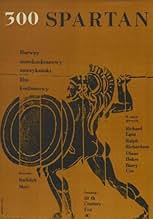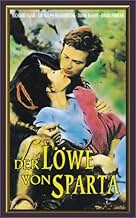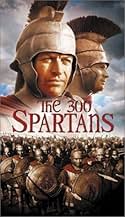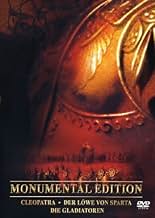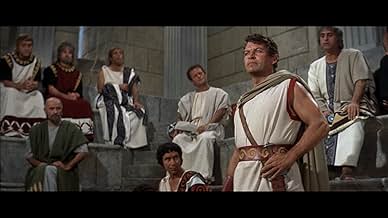Eine kleine Armee von Griechen, angeführt von dreihundert Spartanern, kämpft gegen die gesamte eindringende persische Armee.Eine kleine Armee von Griechen, angeführt von dreihundert Spartanern, kämpft gegen die gesamte eindringende persische Armee.Eine kleine Armee von Griechen, angeführt von dreihundert Spartanern, kämpft gegen die gesamte eindringende persische Armee.
- Themistocles of Athens
- (as Sir Ralph Richardson)
- Myron
- (as Michael Nikolinakos)
Empfohlene Bewertungen
The epic "The 300 Spartans" is a great tale of courage, heroism and idealism. This story has romance, action and drama, with great interpretations and choreography in the battle scenes. I laughed a lot with the witty line of the old goatherd to Phylon: - "Who can understand the way of gods? They create lovely girls and then turn them into wives." The use of red clothes by the Spartan army to hide the blood from the enemies shows how this warriors were war oriented . My vote is eight.
Title (Brazil): "Os 300 de Esparta" ("The 300 from Sparta")
- Persia: "Our arrows will blot out the sun!"
- Sparta: "Good! Then we will fight in the shade..."
With these famous lines from the movie THE 300 SPARTANS, I decided to begin my comment since the words best resemble what clash really took place a long time ago at Thermopylae - one of the most known and captivating battles in history when a mere wave of a few free men dared say "NO" to the ocean of "immortal" Asian hoards. But there are other, more important words that immediately direct our attention on the right track:
"Oh, Stranger, tell the Spartans that we lie here obedient to their word."
For centuries, the sublime words written at Thermopylae addressed to a stranger, anyone who is passing by have touched people. Artists drew paintings, writers wrote stories, and, in 1962 Rudolph Mate used perhaps the most powerful medium of our times, cinema. At the heyday of epic movies, he made THE 300 SPARTANS keeping to all significant "commandments" of a spectacle but also maintaining other important cases that have been noticed in time.
It's true that THE 300 SPARTANS is a visually stunning spectacle. But it is very important to mention that this film, besides the lavish sets, costumes, magnificent crowd scenes made in accordance with the spirit of a colossal movie, is a very captivating and absorbing insight into the historical characters. King Leonidas (Richard Egan) also carries human responsibilities, has a wife whom he loves, owns a very balanced view of his people, is aware of strengths and weaknesses, knows the lack of loyalty, the bitterness of treason but despite all of these, he is equally ready to return on the shield or with it for his people, for Sparta. Phylon (Barry Coe) is a simple Spartan soldier who is, for the time being, deprived of honor to join the army. Although he loves his beautiful woman Ellas (Diane Baker), he is ready to march a huge distance to become one of those who fight. Being granted the right to defend his country is of ultimate importance to him, that's how he was brought up, that's what he has been living for. The family shame (his father's treason) is something he has to cope with for long but individual effort and straightforward desire make him worthy dying for ideals at last. Therefore, we can as well state that THE 300 SPARTANS differs from the latest movie 300 exactly in that character development - the characters here are not only strong men who only fight well and are directed towards dining in hell but human beings with the feelings that they are bound to control, psychological strength that they must retain, and ideals that they live and die for.
The performances are absolutely terrific though some people may not appear to be cast well to their parts. Richard Egan is marvelous as Leonidas. He has that nobility in his manners and that undeniable courage which Leonidas must have had. His best moments include the final sequence when he talks to his men: We must fulfill our duty so that Sparta can be free. Ralph Richardson is very appealing as Themistocles, a remarkable diplomat for whom truth is a heady wine and according to whom there are no hopeless wars but only hopeless cowards. Barry Coe, in spite of his youthful face and gentle manners, does a fine job as persistent Phylon. And David Farrar as Xerxes...here opinions may differ, even more intensely in the latest year when we have seen Rodrigo Santoro in this role. Despite possible comparison, one thing is true, Farrar is too old and through his acting, he rather reminds me of some experienced, tired, and not a very convincing ruler than the exotic, vital, desirous of power and honors master of Persia. Moreover, the pair of Xerxes and Artemisa (Anne Wakefield) makes it all a bit humorous. Yet, I leave that open to everyone's view.
Another factor, except for character development, that goes outside the rules of a spectacle are powerful moments and script. They make THE 300 SPARTANS more similar to SPARTACUS than THE TEN COMMANDMENTS. The absolutely memorable conversation of Leonidas and Hydarnes (Donald Houston) I entailed at the beginning became a symbol of the movie in years. Another brilliant moment is at the cottage of a mountaineer: "Gods create beautiful women and later transform them into wives." Moreover, except for many other terrific script moments, Xerxes is showed at the beginning on his throne saying memorably "At Marathon, my father sent a mere wave, now I lead an ocean." The final scene, though a bit too short, has an unforgettable feeling that can hardly be expressed: the shields kill all Spartans but they are not afraid, they are with their king. I usually reflected on the fact what really made those Spartans immortal in history: was it their tragic end or the absolute loyalty and obedience that they retained to the last breath?
THE 300 SPARTANS is a must see not only for history buffs but for all viewers. The film is made in an accurate way, constitutes a nice history lesson that also talks to modern times and explains much from human ideals universal throughout the world history. It's a captivating story of courage, loyalty, ideals protection and death in dignity. No wonder why this is the film which also moved Frank Miller in his youth and prompted him to write a graphic novel and finally to make a movie.
Indeed, it was the time when an oasis of free patriots clashed with the desert of warriors in captivity and the oasis won in human hearts. 8/10
Naturally the 1962 film version directed by Rudolph Mate will be dated, but the spirit and scheme of things remain on the agenda, with the story given a more holistic coverage of the same battle with its sea component mentioned, a pity that it wasn't filmed. In my opinion when I look back with nostalgia, Swords and Sandals epics in the 60s were always about grandeur with its scale and countless number of extras suited up with equipment and logistics to portray an era long past, without resorting to modern day trickery with computer programs to make up the numbers. Logistics, I can imagine, could be quite the nightmare.
For a tale that's been told since 480 BC, you can bet that interpretations will defer depending on the source, and if compared with 300, there are some aspects here in the story that held more potential. For instance, it would have been great if the sea battles made it to the film, and Leonidas (Richard Egan) conducted a daring raid of the Persian camp with a handful of merry men, which made them go on the offensive instead of just depending the narrow pass at Thermopylae, for a reason none other than to spread chaos and panic, and also to buy the Greeks time to set up their defences.
More importantly, this film doesn't over romanticize the Spartan warriors. Yes they are great in their fighting prowess and their fearsome reputation is legendary, but The 300 Spartans take time off to dwell on the need for unity amongst the squabbling Greek contingents, where unity is strength should everyone stand up and be counted when faced with a collective aggressor. Superstition and religion also played a key role in the methods of the Spartans, as with the key turning point of their betrayal which turned the tides for them. Battle sequences aren't as stylized, and some of the strategies were quite weakly executed to have imagined the Persian army led by Xerxes (David Farrar) himself, also beefed up with his Invincibles troops, couldn't outfight the Spartans since almost all fights are close quartered mêlées.
Dialogue is slanted 60s styled, so don't expect pompous lines screamed across the screen by any character wanting to rouse their troops. Even Richard Egan's Leonidas wears an optimistic smile now and then, and seemed relatively more friendly than the Gerard Butler version who looks like a murderous butcher eager to shove his spear into the rear of his enemies. For all the lean and meanness of Butler's very toned and muscular Leonidas and his Spartan troops, the lack of physique gets camouflaged here through the use of battle armour, and while 300 was essentially a King Leonidas story, this one somehow had a romantic subplot spun between the characters of Ellas (Diane Baker) and Phylon (Barry Coe), with the former persuading her beau to abandon duty for romance and the quieter life.
Still for those who prefer a break from the flashy, exaggerated treatment gladiator style of Snyder's 300, this version may be the more accurate account given its mention and time devoted to the sea component and other Greek troops joining the Spartans, and also without making Xerxes look androgynous. But if you're more of an action junkie, then stick to Snyder's stylized version as the battle sequences here couldn't withstand the test of time compared to what's on offer by filmmakers today.
Wusstest du schon
- WissenswertesSir Ralph Richardson has only four scenes, despite being second billed.
- PatzerWhile most of the Spartans wear the correct headgear, Leonidas and his officers wear Roman legionnaire style helmets that wouldn't be around for about 200 years. (This may have been so that they could easily be identified.)
- Zitate
Hydarnes, Commander of the Immortals: [Xerxes has sent an emissary to demand the Spartan surrender] yesterday, we only probed your positions. When we attack today, our arrows will blot out the sun!
Leonidas, Spartan King: Good; then we will fight in the shade.
Hydarnes, Commander of the Immortals: Leonidas; you cannot win this fight.
Leonidas, Spartan King: Every day we stand is another day for Greece.
[Starts to walk off]
Hydarnes, Commander of the Immortals: Leonidas, wait! Xerxes says that if you and your men lay down your arms, he will allow you to leave peaceably.
Leonidas, Spartan King: [In Greek] Come and take them!
- Crazy CreditsOpening credits prologue: In the Year 480 B.C. King Xerxes of Persia set in motion his enormous slave empire to crush the small group of independent Greek states-the only stronghold of freedom still remaining in the then known world . . .
- VerbindungenEdited into Time Tunnel: Revenge of the Gods (1966)
Top-Auswahl
Details
Box Office
- Budget
- 500.000 £ (geschätzt)
- Laufzeit1 Stunde 54 Minuten
- Farbe
- Seitenverhältnis
- 2.35 : 1
Zu dieser Seite beitragen



